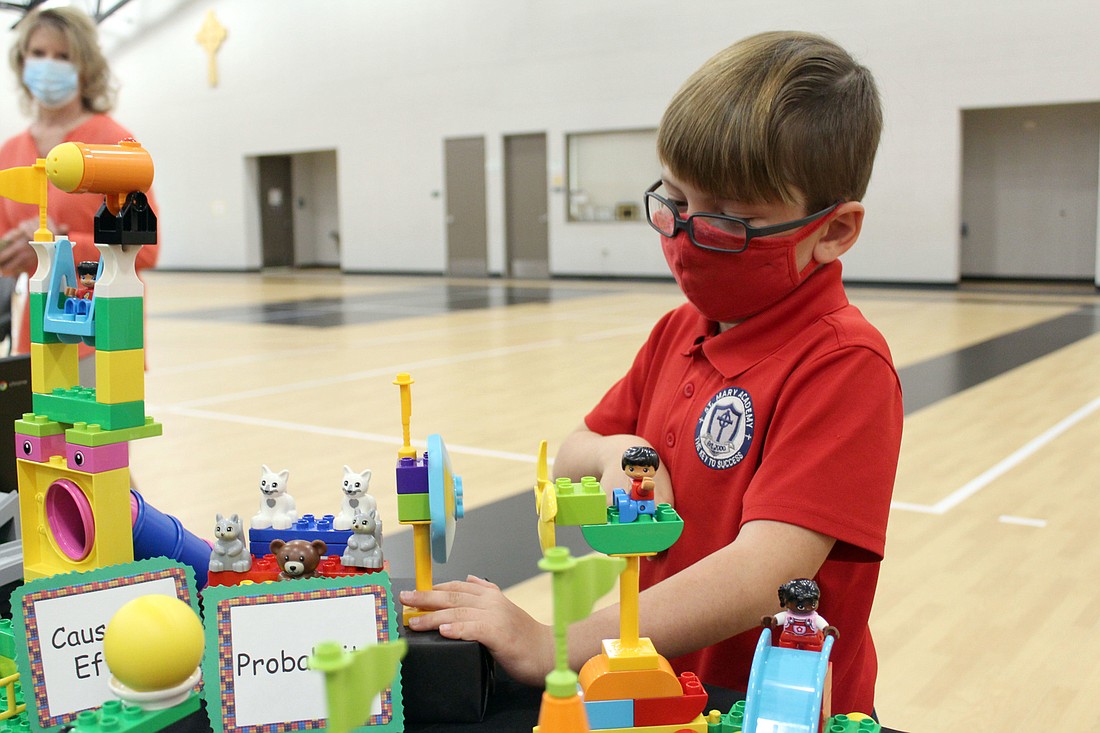- April 24, 2024
-
-
Loading

Loading

Schools across the U.S. are no strangers to programs that increase focus on STEM education, and now, Catholic students across Sarasota County will see changes in their curriculum too.
The Diocese of Venice, which serves about 4,500 students across five Florida counties, including Sarasota County, is updating its curriculum to strengthen STREAM education.
STREAM is an extension of STEM education to include a focus on science, technology, religion, engineering, arts and math. The update is made possible through a partnership between the diocese and FIRST, a global robotics community.
The ultimate goal of the change is to place the diocese’s students ahead of the curve in primary fields of education while promoting core Catholic values.
“We want to create leaders,” Superintendent of Catholic Education Father John Belmonte said. “That’s what we do in our Catholic schools, we create leaders for civil society and the church, and in order for them to be leaders in the future of these areas, we have to educate them for excellence.”
The new curriculum, titled “The Gifts of Christ,” will focus on teaching students about conventional Catholic values — truth, beauty, goodness, affability, fortitude, humility and prudence — through traditional STEM lessons.
“We try to teach to the whole person, so religion is an important piece for us because it captures our Catholic faith,” Belmonte said. “The science, technology, engineering, art and math is just like any subject but we’re going to be able to integrate our faith through these key concepts.”
Bishop of the Diocese in Venice, the Rev. Frank Dewane said the focus on the seven values through project-based learning will help students build soft skills to prepare them for success in the working world while building up their religion.
“This is a great opportunity to look at how students need to look toward goodness, fortitude, beauty and so on and how to put all that together to build up not just the intellectual side, but also the spiritual dimension at the same time,” Dewane said.
The new curriculum will be implemented at all age levels thanks to a commitment from the diocese. More than 500 robots, LEGO and curricular resources were provided by the diocese to make programming possible.
All schools will be given age-appropriate kits and robots to complete their curriculum and compete at various robotics competitions through FIRST programming.
Younger students will use LEGO products such as Duplo blocks, while older students will use more traditional blocks to learn various mathematical and engineering concepts. Students also will use artistic expression to design their robot’s facade.
Each kit increases the difficulty and expands on concepts learned in earlier years. By the time students reach middle and high school, they will be able to build competition-ready robots.
Although robotics is a major part of the program, it is a tool that allows the school system to expand upon the idea of project-based learning and cognitive thought process, diocesan curriculum specialist Jennifer Falestiny said.
School leaders hope the teamwork needed to build the robots and to compete can help students gain self-confidence and real-world skills for careers in the STREAM fields.
“I hope students are given an advantage, a good, solid education that prepares them for whatever future they choose,” Dewane said. “I hope it sparks in each one of them, the gifts they’ve been given by the Lord in terms of their intellect, their creativity, their visioning.”
The program is currently being run in five schools as a pilot program, and Dewane said the response has been positive, so the diocese decided to implement it at every educational level.
Dewane said leaders first discussed implementing it with first grade students and then adding a year each year as the students age, but eventually decided against that plan.
“If it’s going to make the contribution we believe it will, then it’s worth doing it across the board,” he said.
Falestiny said the schools will begin integrating the program for the final quarter of the 2020-21 academic year. Teachers will then receive additional training throughout the summer to be prepared for full implementation in the 2021-22 academic year.